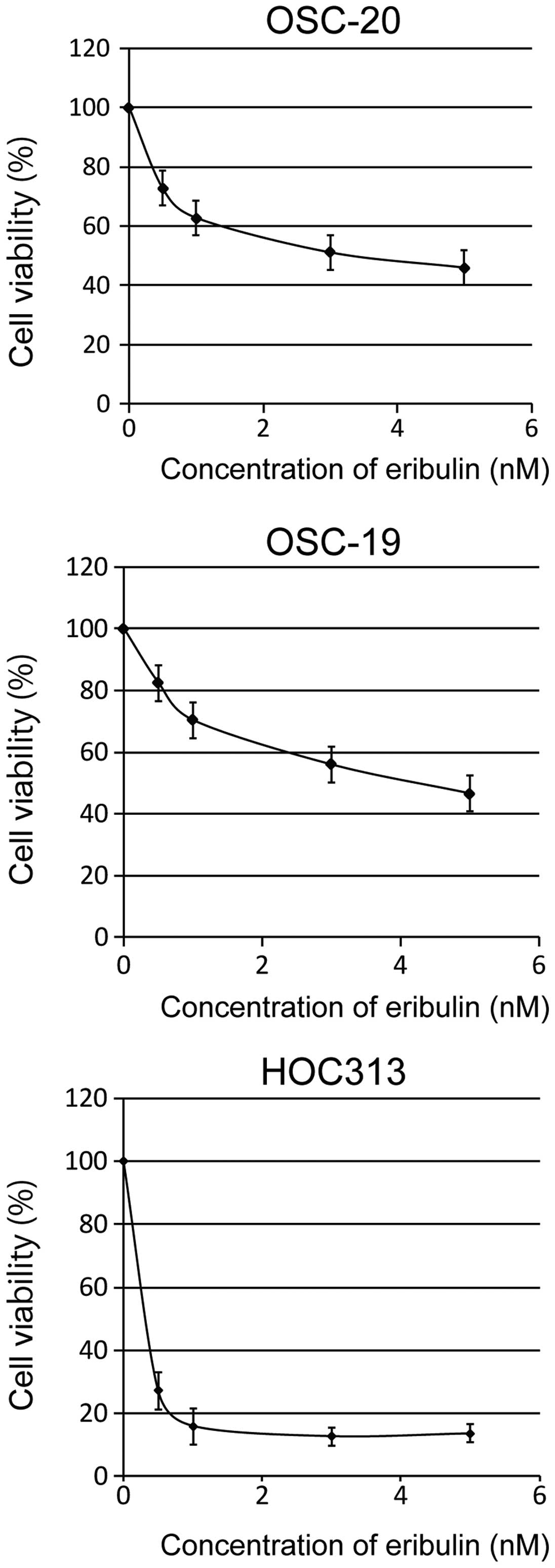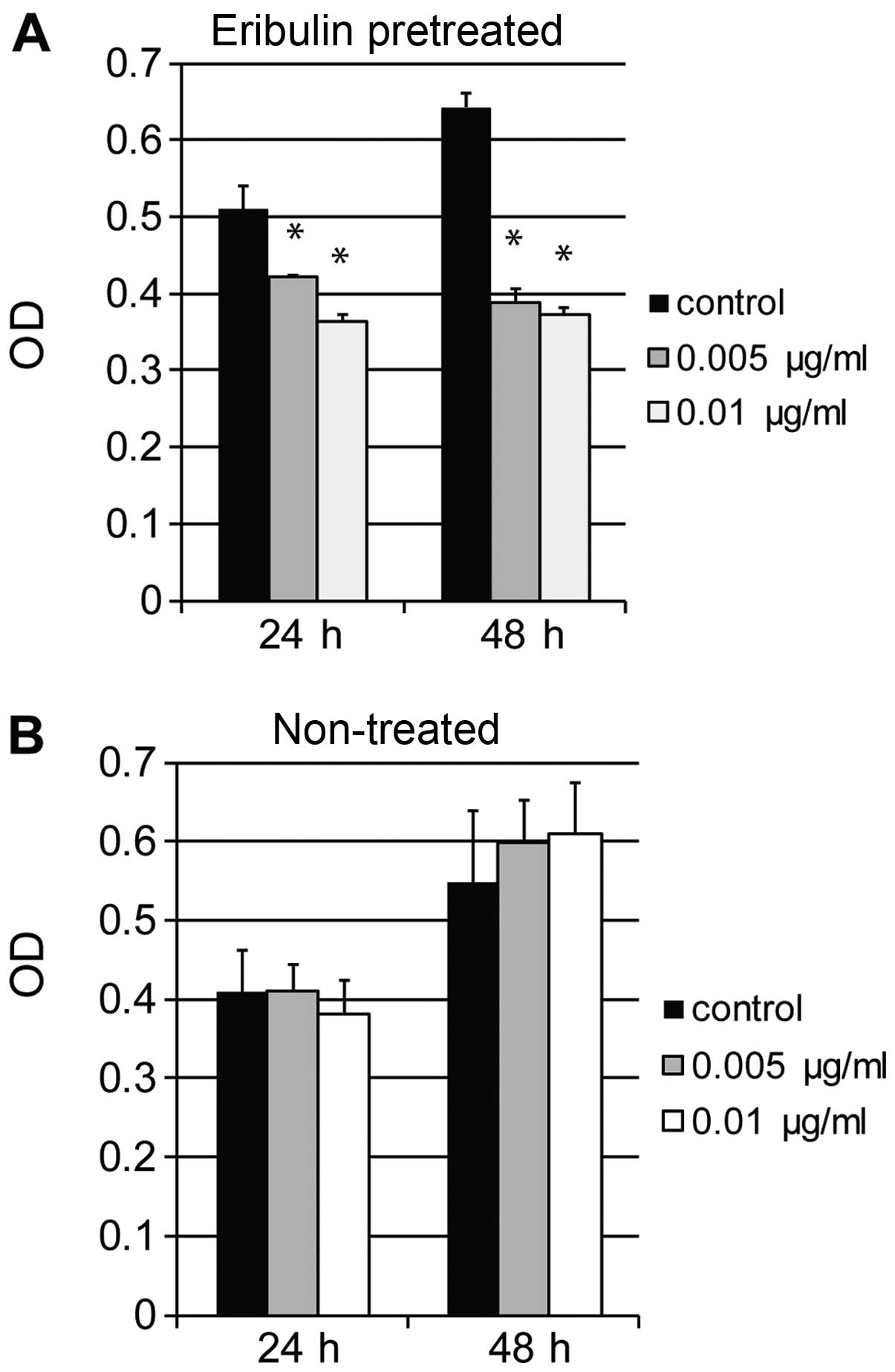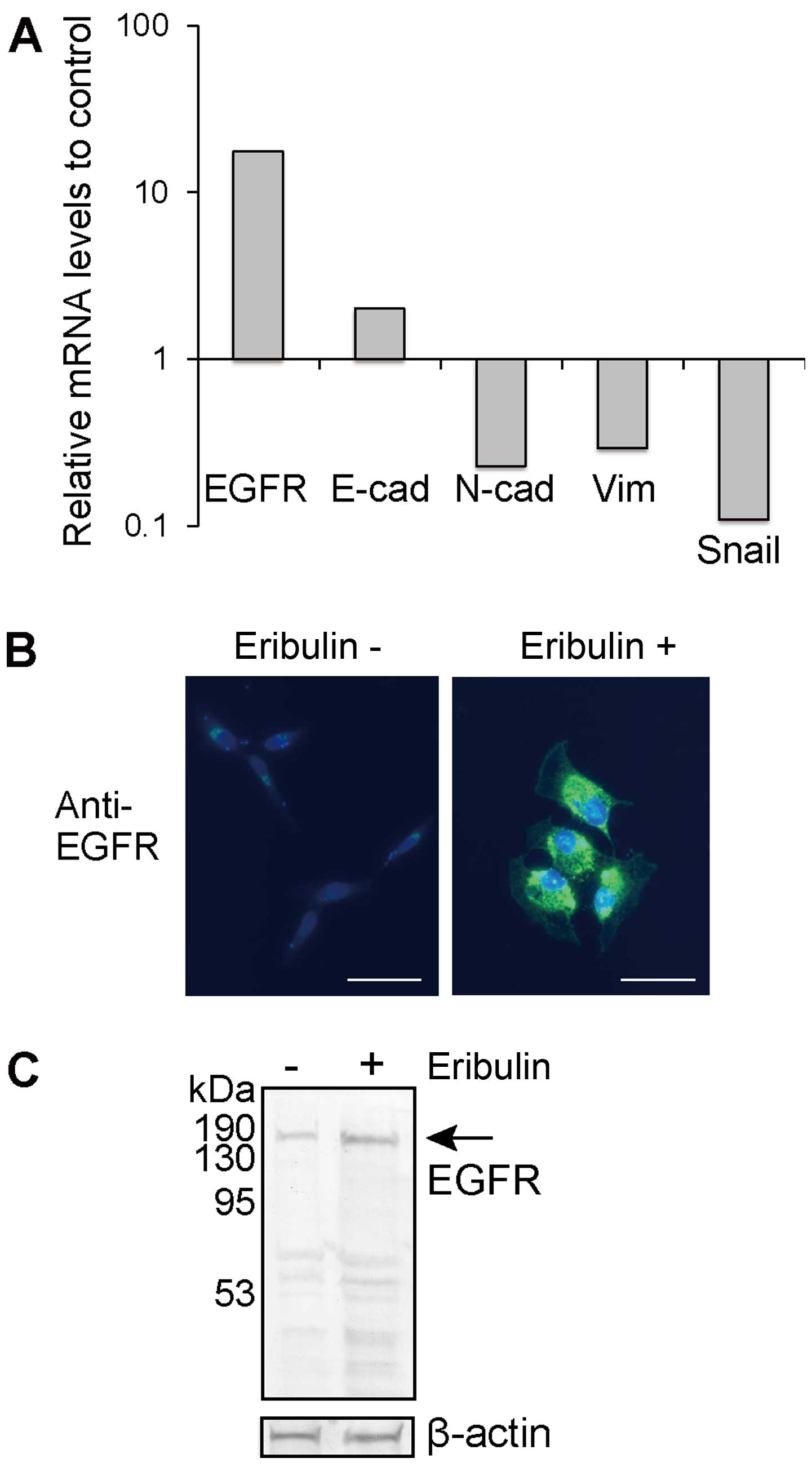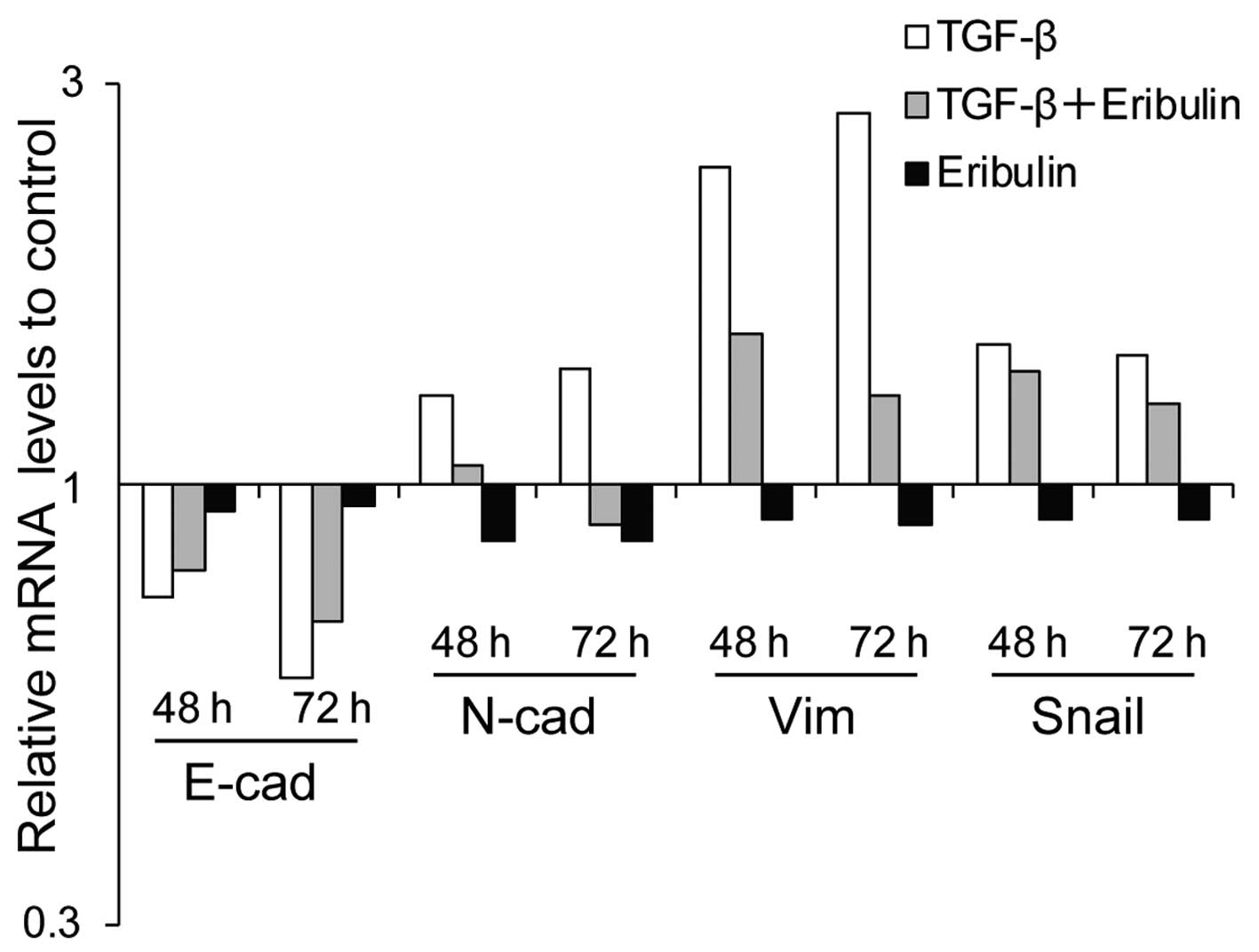|
1
|
Ang KK, Berkey BA, Tu X, Zhang HZ, Katz R,
Hammond EH, Fu KK and Milas L: Impact of epidermal growth factor
receptor expression on survival and pattern of relapse in patients
with advanced head and neck carcinoma. Cancer Res. 62:7350–7356.
2002.PubMed/NCBI
|
|
2
|
Mahipal A, Kothari N and Gupta S:
Epidermal growth factor receptor inhibitors: Coming of age. Cancer
Control. 21:74–79. 2014.PubMed/NCBI
|
|
3
|
Loeffler-Ragg J, Schwentner I, Sprinzl GM
and Zwierzina H: EGFR inhibition as a therapy for head and neck
squamous cell carcinoma. Expert Opin Investig Drugs. 17:1517–1531.
2008. View Article : Google Scholar : PubMed/NCBI
|
|
4
|
Bourhis J, Rivera F, Mesia R, Awada A,
Geoffrois L, Borel C, Humblet Y, Lopez-Pousa A, Hitt R, Villegas ME
Vega, et al: Phase I/II study of cetuximab in combination with
cisplatin or carboplatin and fluorouracil in patients with
recurrent or metastatic squamous cell carcinoma of the head and
neck. J Clin Oncol. 24:2866–2872. 2006. View Article : Google Scholar : PubMed/NCBI
|
|
5
|
Burtness B, Goldwasser MA, Flood W, Mattar
B and Forastiere AA: Eastern Cooperative Oncology Group: Phase III
randomized trial of cisplatin plus placebo compared with cisplatin
plus cetuximab in metastatic/recurrent head and neck cancer: An
Eastern Cooperative Oncology Group study. J Clin Oncol.
23:8646–8654. 2005. View Article : Google Scholar : PubMed/NCBI
|
|
6
|
Shin DM, Donato NJ, Perez-Soler R, Shin
HJ, Wu JY, Zhang P, Lawhorn K, Khuri FR, Glisson BS, Myers J, et
al: Epidermal growth factor receptor-targeted therapy with C225 and
cisplatin in patients with head and neck cancer. Clin Cancer Res.
7:1204–1213. 2001.PubMed/NCBI
|
|
7
|
Vermorken JB, Mesia R, Rivera F, Remenar
E, Kawecki A, Rottey S, Erfan J, Zabolotnyy D, Kienzer HR, Cupissol
D, et al: Platinum-based chemotherapy plus cetuximab in head and
neck cancer. N Engl J Med. 359:1116–1127. 2008. View Article : Google Scholar : PubMed/NCBI
|
|
8
|
Baselga J, Trigo JM, Bourhis J, Tortochaux
J, Cortés-Funes H, Hitt R, Gascón P, Amellal N, Harstrick A and
Eckardt A: Phase II multicenter study of the antiepidermal growth
factor receptor monoclonal antibody cetuximab in combination with
platinum-based chemotherapy in patients with platinum-refractory
metastatic and/or recurrent squamous cell carcinoma of the head and
neck. J Clin Oncol. 23:5568–5577. 2005. View Article : Google Scholar : PubMed/NCBI
|
|
9
|
Herbst RS, Arquette M, Shin DM, Dicke K,
Vokes EE, Azarnia N, Hong WK and Kies MS: Phase II multicenter
study of the epidermal growth factor receptor antibody cetuximab
and cisplatin for recurrent and refractory squamous cell carcinoma
of the head and neck. J Clin Oncol. 23:5578–5587. 2005. View Article : Google Scholar : PubMed/NCBI
|
|
10
|
Vermorken JB, Trigo J, Hitt R, Koralewski
P, Diaz-Rubio E, Rolland F, Knecht R, Amellal N, Schueler A and
Baselga J: Open-label, uncontrolled, multicenter phase II study to
evaluate the efficacy and toxicity of cetuximab as a single agent
in patients with recurrent and/or metastatic squamous cell
carcinoma of the head and neck who failed to respond to
platinum-based therapy. J Clin Oncol. 25:2171–2177. 2007.
View Article : Google Scholar : PubMed/NCBI
|
|
11
|
Lynch TJ, Bell DW, Sordella R,
Gurubhagavatula S, Okimoto RA, Brannigan BW, Harris PL, Haserlat
SM, Supko JG, Haluska FG, et al: Activating mutations in the
epidermal growth factor receptor underlying responsiveness of
non-small-cell lung cancer to gefitinib. N Engl J Med.
350:2129–2139. 2004. View Article : Google Scholar : PubMed/NCBI
|
|
12
|
Paez JG, Jänne PA, Lee JC, Tracy S,
Greulich H, Gabriel S, Herman P, Kaye FJ, Lindeman N, Boggon TJ, et
al: EGFR mutations in lung cancer: Correlation with clinical
response to gefitinib therapy. Science. 304:1497–1500. 2004.
View Article : Google Scholar : PubMed/NCBI
|
|
13
|
Lemos-González Y, de la Cadena Páez M,
Rodríguez-Berrocal FJ, Rodríguez-Piñeiro AM, Pallas E and Valverde
D: Absence of activating mutations in the EGFR kinase domain in
Spanish head and neck cancer patients. Tumour Biol. 28:273–279.
2007. View Article : Google Scholar : PubMed/NCBI
|
|
14
|
Kimura I, Kitahara H, Ooi K, Kato K,
Noguchi N, Yoshizawa K, Nakamura H and Kawashiri S: Loss of
epidermal growth factor receptor expression in oral squamous cell
carcinoma is associated with invasiveness and
epithelial-mesenchymal transition. Oncol Lett. 11:201–207.
2016.PubMed/NCBI
|
|
15
|
Uramoto H, Iwata T, Onitsuka T, Shimokawa
H, Hanagiri T and Oyama T: Epithelial-mesenchymal transition in
EGFR-TKI acquired resistant lung adenocarcinoma. Anticancer Res.
30:2513–2517. 2010.PubMed/NCBI
|
|
16
|
Chung JH, Rho JK, Xu X, Lee JS, Yoon HI,
Lee CT, Choi YJ, Kim HR, Kim CH and Lee JC: Clinical and molecular
evidences of epithelial to mesenchymal transition in acquired
resistance to EGFR-TKIs. Lung Cancer. 73:176–182. 2011. View Article : Google Scholar : PubMed/NCBI
|
|
17
|
Sequist LV, Waltman BA, Dias-Santagata D,
Digumarthy S, Turke AB, Fidias P, Bergethon K, Shaw AT, Gettinger
S, Cosper AK, et al: Genotypic and histological evolution of lung
cancers acquiring resistance to EGFR inhibitors. Sci Transl Med.
3:75ra26. 2011. View Article : Google Scholar : PubMed/NCBI
|
|
18
|
Yoshida T, Ozawa Y, Kimura T, Sato Y,
Kuznetsov G, Xu S, Uesugi M, Agoulnik S, Taylor N, Funahashi Y, et
al: Eribulin mesilate suppresses experimental metastasis of breast
cancer cells by reversing phenotype from epithelial-mesenchymal
transition (EMT) to mesenchymal-epithelial transition (MET) states.
Br J Cancer. 110:1497–1505. 2014. View Article : Google Scholar : PubMed/NCBI
|
|
19
|
Towle MJ, Salvato KA, Budrow J, Wels BF,
Kuznetsov G, Aalfs KK, Welsh S, Zheng W, Seletsky BM, Palme MH, et
al: In vitro and in vivo anticancer activities of synthetic
macrocyclic ketone analogues of halichondrin B. Cancer Res.
61:1013–1021. 2001.PubMed/NCBI
|
|
20
|
Kuznetsov G, Towle MJ, Cheng H, Kawamura
T, TenDyke K, Liu D, Kishi Y, Yu MJ and Littlefield BA: Induction
of morphological and biochemical apoptosis following prolonged
mitotic blockage by halichondrin B macrocyclic ketone analog E7389.
Cancer Res. 64:5760–5766. 2004. View Article : Google Scholar : PubMed/NCBI
|
|
21
|
Okouneva T, Azarenko O, Wilson L,
Littlefield BA and Jordan MA: Inhibition of centromere dynamics by
eribulin (E7389) during mitotic metaphase. Mol Cancer Ther.
7:2003–2011. 2008. View Article : Google Scholar : PubMed/NCBI
|
|
22
|
Towle MJ, Nomoto K, Asano M, Kishi Y, Yu
MJ and Littlefield BA: Broad spectrum preclinical antitumor
activity of eribulin (Halaven(R)): Optimal effectiveness under
intermittent dosing conditions. Anticancer Res. 32:1611–1619.
2012.PubMed/NCBI
|
|
23
|
Smith JA, Wilson L, Azarenko O, Zhu X,
Lewis BM, Littlefield BA and Jordan MA: Eribulin binds at
microtubule ends to a single site on tubulin to suppress dynamic
instability. Biochemistry. 49:1331–1337. 2010. View Article : Google Scholar : PubMed/NCBI
|
|
24
|
Cortes J, O'Shaughnessy J, Loesch D, Blum
JL, Vahdat LT, Petrakova K, Chollet P, Manikas A, Diéras V,
Delozier T, et al: EMBRACE (Eisai Metastatic Breast Cancer Study
Assessing Physician's Choice Versus E7389) investigators: Eribulin
monotherapy versus treatment of physician's choice in patients with
metastatic breast cancer (EMBRACE): A phase 3 open-label randomised
study. Lancet. 377:914–923. 2011. View Article : Google Scholar : PubMed/NCBI
|
|
25
|
Yokoi T, Hirata S, Nishimura F, Miyakawa
A, Odajima T and Kohama G: Some properties of a newly established
human cell line derived from an oral squamous carcinoma. Tumor Res.
25:93-91-931990.
|
|
26
|
Yokoi T, Homma H and Odajima T:
Establishment and characterization of OSC-19 cell line in serum and
protein free culture. Tumor Res. 24:1–17. 1988.
|
|
27
|
Ishisaki A, Oida S, Momose F, Amagasa T,
Rikimaru K, Ichijo H and Sasaki S: Identification and
characterization of autocrine-motility-factor-like activity in oral
squamous-cell-carcinoma cells. Int J Cancer. 59:783–788. 1994.
View Article : Google Scholar : PubMed/NCBI
|
|
28
|
Livak KJ and Schmittgen TD: Analysis of
relative gene expression data using real-time quantitative PCR and
the 2(−Delta Delta C(T)) method. Methods. 25:402–408. 2001.
View Article : Google Scholar : PubMed/NCBI
|
|
29
|
Dezső Z, Oestreicher J, Weaver A, Santiago
S, Agoulnik S, Chow J, Oda Y and Funahashi Y: Gene expression
profiling reveals epithelial mesenchymal transition (EMT) genes can
selectively differentiate eribulin sensitive breast cancer cells.
PLoS One. 9:e1061312014. View Article : Google Scholar : PubMed/NCBI
|
|
30
|
Boyer B, Vallés AM and Edme N: Induction
and regulation of epithelial-mesenchymal transitions. Biochem
Pharmacol. 60:1091–1099. 2000. View Article : Google Scholar : PubMed/NCBI
|
|
31
|
Helleman J, Smid M, Jansen MP, van der
Burg ME and Berns EM: Pathway analysis of gene lists associated
with platinum-based chemotherapy resistance in ovarian cancer: The
big picture. Gynecol Oncol. 117:170–176. 2010. View Article : Google Scholar : PubMed/NCBI
|
|
32
|
Haslehurst AM, Koti M, Dharsee M, Nuin P,
Evans K, Geraci J, Childs T, Chen J, Li J, Weberpals J, et al: EMT
transcription factors snail and slug directly contribute to
cisplatin resistance in ovarian cancer. BMC Cancer. 12:912012.
View Article : Google Scholar : PubMed/NCBI
|
|
33
|
Yauch RL, Januario T, Eberhard DA, Cavet
G, Zhu W, Fu L, Pham TQ, Soriano R, Stinson J, Seshagiri S, et al:
Epithelial versus mesenchymal phenotype determines in vitro
sensitivity and predicts clinical activity of erlotinib in lung
cancer patients. Clin Cancer Res. 11:8686–8698. 2005. View Article : Google Scholar : PubMed/NCBI
|
|
34
|
Thomson S, Petti F, Sujka-Kwok I, Epstein
D and Haley JD: Kinase switching in mesenchymal-like non-small cell
lung cancer lines contributes to EGFR inhibitor resistance through
pathway redundancy. Clin Exp Metastasis. 25:843–854. 2008.
View Article : Google Scholar : PubMed/NCBI
|
|
35
|
Thomson S, Buck E, Petti F, Griffin G,
Brown E, Ramnarine N, Iwata KK, Gibson N and Haley JD: Epithelial
to mesenchymal transition is a determinant of sensitivity of
non-small-cell lung carcinoma cell lines and xenografts to
epidermal growth factor receptor inhibition. Cancer Res.
65:9455–9462. 2005. View Article : Google Scholar : PubMed/NCBI
|
|
36
|
Adam L, Zhong M, Choi W, Qi W, Nicoloso M,
Arora A, Calin G, Wang H, Siefker-Radtke A, McConkey D, et al:
miR-200 expression regulates epithelial-to-mesenchymal transition
in bladder cancer cells and reverses resistance to epidermal growth
factor receptor therapy. Clin Cancer Res. 15:5060–5072. 2009.
View Article : Google Scholar : PubMed/NCBI
|
|
37
|
Barr S, Thomson S, Buck E, Russo S, Petti
F, Sujka-Kwok I, Eyzaguirre A, Rosenfeld-Franklin M, Gibson NW,
Miglarese M, et al: Bypassing cellular EGF receptor dependence
through epithelial-to-mesenchymal-like transitions. Clin Exp
Metastasis. 25:685–693. 2008. View Article : Google Scholar : PubMed/NCBI
|
|
38
|
Jordan MA, Kamath K, Manna T, Okouneva T,
Miller HP, Davis C, Littlefield BA and Wilson L: The primary
antimitotic mechanism of action of the synthetic halichondrin E7389
is suppression of microtubule growth. Mol Cancer Ther. 4:1086–1095.
2005. View Article : Google Scholar : PubMed/NCBI
|
|
39
|
Dong C, Li Z, Alvarez R Jr, Feng XH and
Goldschmidt-Clermont PJ: Microtubule binding to Smads may regulate
TGF beta activity. Mol Cell. 5:27–34. 2000. View Article : Google Scholar : PubMed/NCBI
|


















